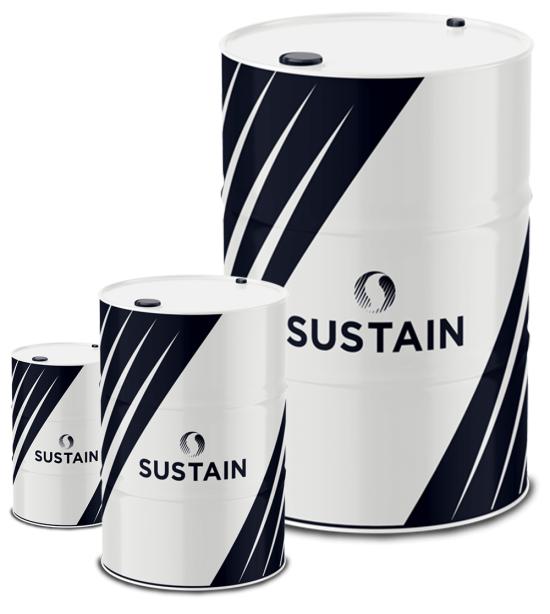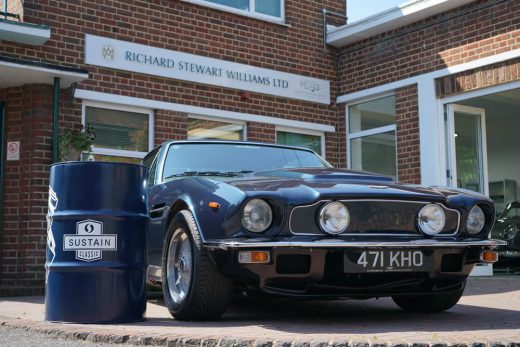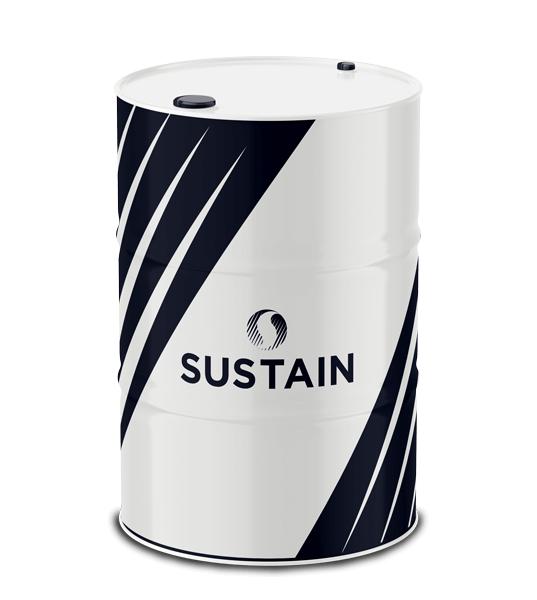A balanced blend that takes care of your vehicleS, with exceptional environmental benefits. It contains at least 80% sustainable content.

FUEL SPECIFICATION

98 RON / 88 MON
RON: The Research Octane Number (RON) measures fuel’s resistance to engine knocking, which is critical in high-compression race engines. Higher RON values are better at preventing detonation during intense acceleration and at protecting engines under extreme loads.
MON: The Motor Octane Number (MON) gauges the fuel’s knock resistance under high-speed, high-load conditions, like full-throttle laps. Higher MON values are better for carburetted vehicles in demanding race environments, ensuring stable combustion during sustained high RPMs, which keeps race engines durable and responsive. A low MON can cause power loss or engine damage under high stress.

14.1 STOICH AFR
STOICH AFR: The Stoichiometric Air-Fuel Ratio (STOICH AFR) measures the perfect air-fuel mix for efficient engine burning, boosting power and fuel economy. A precise STOICH AFR of 14.7:1 is best for balancing power and fuel economy. However, for motorsport, you generally want to prioritise performance over efficiency and run slightly richer (lower ratio) for more power.

<1% ETHANOL CONTENT
Ethanol: A plant-based fuel additive derived from crops like corn or sugarcane, is blended into gasoline to enhance performance or reduce emissions, but its impact varies between motorsport and classic vehicles. In racing, high ethanol enhances octane and power, though it needs engine tuning for efficiency and demands more fuel flow due to lower energy content. For classic cars, low or no ethanol is best, as high ethanol can corrode old fuel systems, causing damage.

0.753kg/L DENSITY (SG)
Density: Fuel density, the weight per volume, affects how much energy your fuel delivers. Moderately high density is better, as it can provide more energy for better power and mileage, but overly dense fuel may strain systems.

3.5% OXYGEN CONTENT
Oxygen content: The oxygen levels in fuel help burn cleaner and more efficiently in your engine. Higher oxygen content is better for performance, allowing faster burning and more aggressive tuning, but it can reduce fuel economy due to less energy.

70kPa DVPE
Vapour pressure (RVP): Vapour pressure measures how easily fuel turns to vapour, affecting throttle response and combustion in engines. Higher vapour pressure is particularly useful in cold weather environments to start your vehicle, but is less relevant once running. Combined with Initial Boiling Point (IBP), it indicates the fuel volatility. The lower is better for launches and early throttle response.
Lower volatile fuels enhance charge cooling, improving air density in the intake or cooling combustion temps in the cylinder, reducing oil temps, which is ideal for endurance racing or hot weather. High RVP in hot conditions can cause vapour lock, disrupting fuel delivery and risking misfires or stalling.

UNLEADED

SUITABLE FOR CATALYSTS

201oC FBP (FINAL BOILING POINT) TYPICAL
FBP: The Final Boiling Point (FBP) is the temperature at which fuel fully evaporates during refining, influencing combustion efficiency in high-revving race engines. A lower FBP is better, as it helps the fuel burn completely to maximise power and prevent deposits that could slow performance. A high FBP can cause incomplete burning, reducing power and risking engine wear.
SUSTAINABILITY CREDENTIALS
TYPE OF SUSTAINABLE FUEL –
BIOFUEL
80%
SUSTAINABILITY
80%
SUSTAINABLE COMPONENTS
Sustainable components: Components within the fuel that derive from renewable sources, like agricultural waste (e.g., straw) and forestry waste (e.g., wood pulp) to reduce environmental harm. They are sourced from suppliers upholding rigorous socio-economic standards, including fair labour practices and ethical conduct.
20%
FOSSIL CHEMISTRY
Fossil chemistry: Components within the fuel that derive from non-renewable ancient organic matter that often contains high energy density, which is great for maximum power and speed, but not as good for the environment due to releasing carbon into the atmosphere that was locked away.
0%
MASS BALANCED CONTENT
Mass Balanced Fuels: Mass balancing can be used to certify a fuel as 100% fossil-free when, in reality, the product you receive may have carbon molecules in it that are not renewable. The process involves carefully tracking the volume of renewable materials introduced into the system. These renewable inputs are then allocated to specific fuels, allowing manufacturers to claim a portion of the final product as renewable, even if the physical fuel contains a mix of fossil and renewable molecules. This approach does not guarantee that the fuel delivered to the end user is entirely fossil-free, but it ensures that an equivalent amount of renewable fuel has been introduced into the supply chain, effectively displacing fossil fuel use.
In simple terms, manufacturers can integrate fossil and renewable feedstocks within the same production system by utilising existing refining and distribution infrastructure to maximise efficiency and minimise costs.
By keeping track of the quantities of renewable content and then allocating that amount to certain products, you can gain verification of the content through third parties, such as the International Sustainability and Carbon Certification (ISCC) chain of custody mass balance system, audit and verify that the renewable content claimed aligns with the actual renewable inputs.
This is similar to the concept of green electricity tariffs. You may pay for a green tariff, but that doesn’t mean the electricity coming through your sockets is any greener than that of your neighbour on a standard tariff. This means that we keep score of how many green electricity units have gone into to the grid and these are allocated to users according to their tariff. We just have to make sure the scores tally up at the end.
65%
GHG SAVINGS
1025 gCO2e/L
CARBON INTENSITY PER LITRE
Details
SUPER 80 is a sustainable petrol designed for use in Classic and Heritage vehicles. It is formulated from 2nd generation bio-mass derived renewable hydrocarbons, and further tailored using traditional fuel components for performance benefits. 2nd Generation bio-mass feedstocks are considered to be waste, and do not compete with food production. Forecourt petrol contains up to 10% Ethanol, which can cause corrosion and material compatibility issues. All SUSTAIN Classic petrols contain <1% Ethanol to mitigate against these issues.
FUELLED BY SUSTAIN CLASSIC

EN228

FIM CAT 1

FIM CAT 2

Appendix J Standard

SUSTAIN FUEL IN ACTION
See the wide range of vehicles already running on the SUSTAIN Classic Super 80 fuel.

Mazda MX5 Mk 1
1997
1 year using sustain

Austin
1930
1 year using sustain

Aston Martin V8
1973
1 year using sustain
WHERE TO
FUEL UP?
View Fuel Locations

YOUR SUPER 80 QUESTIONS, ANSWERED
Will using the sustainable fuel have any negative effect on the performance of my vehicle?
You should experience no negative effects from running on the SUSTAIN Classic Super 80 fuel. They have been fully tested on a wide range of vehicles. The elements traditionally associated with bio (i.e. ethanol) are removed as part of the production process. It undergoes a complete molecular restructure to produce a fuel that looks identical to traditional fossil petrol, but from biological sources. This is perfectly suited to classic engines.
Do the additive packages come separately in the Super 80 fuel?
No, the additive packages are pre-blended within the SUSTAIN Classic Super 80 fuel.
Can all classic vehicles use this SUSTAIN fuel?
If your vehicle is running on petrol from a pump or other traditional petrols SUSTAIN Classic Super 80 fuel will work in your vehicle(s). If you are still not sure please speak to your retailer.
Can I mix SUSTAIN Classic sustainable fuel with traditional petrol?
Yes this fuel can be mixed with all traditional petrols.
Can I switch back to regular fuel after using SUSTAIN Classic?
Yes, this is a drop-in fuel, meaning it can be mixed with all traditional fossil petrols.
Why is SUSTAIN Classic only 80% sustainable?
The availability of true fossil free fuel components is limited. So, we’re setting truthful and realistic goals, producing fuels that have a meaningful impact whilst meeting the demands of the user. While we could use ‘mass balancing’ techniques to certify this fuel as 100% sustainable, we believe that it is important to be open about technology readiness and traceability. The industry will get there with the right support – which is why we think it’s important to start getting these products into the hands of consumers so they can see how easy and effective the switch could be. As more feedstocks become available you will see these fuels contain more traceable sustainable elements.
Can this SUSTAIN Classic sustainable fuel be used in different weather conditions?
SUSTAIN Classic fuels have been optimised for use all year round by carefully balancing volatility parameters.
Is the SUSTAIN Classic fuel compatible with the engine and fuel system components of my classic car?
If your vehicle is running on pump petrol or other traditional petrols the SUSTAIN Classic fuel will work in your vehicle(s). The SUSTAIN Classic range of fuels all contain <1% ethanol and so are compatible with all engine components and materials. If you are still not sure please speak to your retailer
Does the SUSTAIN Classic fuel have an expiration date?
We recommend a typical shelf life of between 12-18 months. Best practice must be followed in terms of keeping fuel away from extreme heat and sources of water and sealing canisters after use.
What is the mileage per gallon with this sustainable SUSTAIN Classic fuel in comparison to traditional fuels?
The mile per gallon (mpg) figures will be equal to traditional pump fuel. Testing has shown that some vehicles have improved MPG figures.
Is there any modification needed to use SUSTAIN Classic in my classic car?
No modifications to your vehicle are required.
Will the use of this SUSTAIN Classic fuel change the exhaust smell or sound of my classic car?
No, you should experience no change.
Is there any difference in the cold start performance of the car when using this sustainable SUSTAIN Classic fuel?
No. SUSTAIN Classic fuels have been designed with a carefully balanced volatility for year round use.
If the SUSTAIN Classic fuel comes from Bio how does it not damage my engine?
The elements traditionally associated with bio (i.e. ethanol) are removed as part of the production process. It undergoes a complete molecular restructure to produce a fuel that looks identical to traditional fossil petrol, but from biological sources. This is perfectly suited to classic engines.





